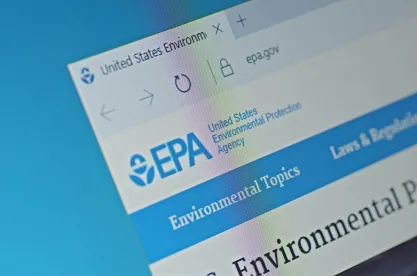On July 21, 2023, the US Environmental Protection Agency (EPA) issued a long-awaited final rule that will make it difficult for sources to continue to rely on an “emergency” to avoid liability for permit violations under Title V of the Clean Air Act.
The final rule follows in the footsteps of EPA’s removal of the startup, shutdown, and malfunction relief previously afforded to sources. It signals EPA’s intent to rely upon case-by-case enforcement discretion, rather than categorical relief, to impose liability for air permit violations.
The rule, available here, removes the “emergency” affirmative defense provisions from the federal Title V operating permit program regulations. EPA has directed state permitting programs with emergency affirmative defense provisions to submit revisions to their rules consistent with the final rule or request an extension by August 21, 2024. Legal challenges to the final rule are anticipated.
Repeal of Emergency Defense
The emergency affirmative defense provisions, located in 40 CFR 70.6(g) and 71.6(g), protected facilities from liability for Title V air permit violations during emergency situations. EPA defined an emergency as “any situation arising from sudden and reasonably unforeseeable events beyond the control of the source, including acts of God, which situation requires immediate corrective action to restore normal operation, and that causes the source to exceed a technology-based emission limitation under the permit, due to unavoidable increases in emissions attributable to the emergency.” EPA previously proposed repealing the affirmative defense in 2016 but did not finalize the removal. The Biden Administration renewed the proposal to repeal the defense in March of 2022.
The repeal of the affirmative defense provisions was finalized on July 21, 2023. In accordance with the repeal, EPA expects states that have adopted similar affirmative defense provisions in their Title V Operating Permit programs to remove such provisions or request an extension by August 21, 2024. The agency also expects that similar provisions be removed from individual operating permits during the ordinary course of business.
Rationale
EPA eliminated the provisions because of a belief that the affirmative defense is inconsistent with the enforcement structure of the Clean Air Act under the DC Court of Appeals’ decision in NRDC v. EPA and other similar cases.[1] The agency’s argument is that sections 113 and 304 of the Clean Air Act preclude affirmative defense provisions that limit a court’s ability to decide what the appropriate remedy is in an enforcement action. In NRDC v. EPA, the court vacated a similar affirmative defense in EPA’s hazardous air pollutant regulations for the Portland Cement industry, holding that it interfered with the court’s authority to decide on an ultimate penalty. EPA has taken a similar stance on affirmative defenses in other areas of the Clean Air Act, including New Source Performance Standards and National Emission Standards for Hazardous Air Pollutants.
Next Steps
Removal of these affirmative defense provisions will make compliance with Title V permits more difficult during emergency situations, when compliance with emission limits may be impossible. EPA noted that “if a source believes it is unable to comply with emissions standards as a result of an emergency, the EPA may use its case-by-case enforcement discretion to determine whether to initiate enforcement, as appropriate.” However, how and under what circumstances state permitting authorities (and EPA) will use such enforcement discretion is unknown.
Nonetheless, the issue of the legality of affirmative defenses more broadly under the Clean Air Act may not yet be fully settled. There is currently a pending challenge to the Obama-era policy requiring states to remove similar start-up, shut-down, or malfunction defenses from state implementation plans before the DC Circuit.[2] One core issue in the case is whether EPA’s interpretation that the holding in NRDC on affirmative defenses extends beyond Clean Air Act Section 112 to other sections of the Act. Oral arguments were heard in that case in March of 2022, and a decision adverse to EPA on their interpretation of NRDC will impact how affirmative defenses are viewed going forward.
We will need to wait and see what, if any, legal challenges to the final rule arise. However, in the interim, sources should monitor what actions their respective state permitting authorities take in response to the rule.
[1] 749 F.3d 1055 (DC Cir. 2014); see also Sierra Club v. EPA, 551 F.3d 1019 (DC Cir. 2008); US Sugar Corp. v. EPA, 830 F.3d 579 (DC Cir. 2016), amended on rehearing on unrelated grounds, US Sugar Corp v. EPA, 844 F.3d 268 (DC Cir. 2016).
[2] See Env’t Comm. of the Florida Elec. Power Coordinating Grp., Inc., v. EPA, Case No. 15-1239 (DC Cir).




 />i
/>i

